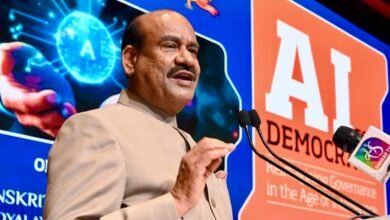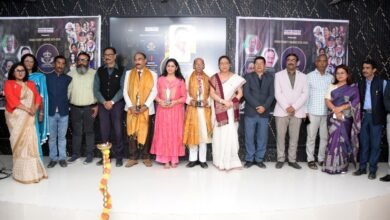PM attends the first “Arun Jaitley Memorial Lecture”

The Prime Minister, Shri Narendra Modi attended the first ‘Arun Jaitley Memorial Lecture’ (AJML), by Mr. Tharman Shanmugaratnam, Senior Minister, Government of Singapore, today at New Delhi. The Prime Minister also addressed the gathering during the event.
Speaking on the occasion, the Prime Minister recalled his close friendship with the former Prime Minister of Japan Mr Shinzo Abe, who passed away today. Paying rich tributes to Mr Abe, the Prime Minister said that today is a day of irreparable loss and unbearable pain for him. Calling Mr Abe a reliable friend of India, the Prime Minister underlined the growth of India-Japan relations based on the shared heritage of the two countries during the tenure of Mr Shinzo Abe. Through the projects that are being undertaken with the help of Japan, Mr Abe will remain in the hearts of Indians for years to come, he said.
The Prime Minister fondly remembered his other friend, Shri Arun Jaitley, in whose memory today’s programme was held. The Prime Minister said, “When we remember the days gone by, I remember many things about them, many incidents related to them. We all were in awe of his oratory. His personality was full of diversity, his nature was friendly to all.”
The Prime Minister recalled Shri Jaitely’s enduring one-liners. Paying homage to Shri Jaitley, the Prime Minister said that everyone feels his absence.
The Prime Minister thanked Mr. Tharman Shanmugaratnam, Senior Minister, Government of Singapore, for his ‘Arun Jaitley Memorial Lecture’. He praised the depth of his intellect, research and inclusion of local touch in his research. The Prime Minister said that the topic of today’s lecture “Growth through Inclusivity, Inclusivity through Growth’ is the foundation of the government’s development policy. “In simple terms, this theme, according to me, is Sabka Saath Sabka Vikas”, he said.
The theme, the Prime Minister continued, captures the challenges and dilemma of today’s policy makers. The Prime Minister posed the question “Is right growth possible without inclusion? Can inclusion be thought of without growth?” The Prime Minister replied “The gist of my experiences of 20 years as Head of Government is that – without inclusion, real growth is not possible. And, without growth the goal of inclusion too cannot be accomplished.” That is why, he added, ‘we adopted the way of growth through inclusivity and tried for everyone’s inclusion’.
He said the speed and scale of inclusion in the last 8 years has been unprecedented in the world. To illustrate his point, the Prime Minister listed measures like providing gas connections to more than 9 crore women, more than 10 crore toilets for the poor, more than 45 crore Jan Dhan accounts, 3 crore pucca houses to the poor. He further explained that by ensuring free treatment of upto Rs 5 lakh for 50 crore people under Ayushman Scheme and more than 3.5 crore patients having availed the free treatment in the last 4 years, inclusion was focussed but this led to increased demand and much better growth and opportunities as almost one third population of India came in the ambit of quality healthcare. Ayushman Bharat has transformed the healthcare sector in India, he said and went on to describe the strides in the healthcare infrastructure. He pointed out that “before 2014, the average of our country was that 50 medical colleges were built in 10 years. Whereas in the last 7-8 years, 209 new medical colleges have been built in India, more than 4 times than before.” Furthermore, “There has been an increase of 75% in undergraduate medical seats in India in the last 7-8 years. Now the number of annual total medical seats has almost doubled in India.” The Prime Minister said through these figures we can see the impact of an inclusivity scheme on the growth of the sector.
The Prime Minister said through 5 lakh common service centres, UPI and PM SVANidhi scheme for street vendors the ambit of inclusion has been widened. Similarly, Aspirational District and education in mother tongue in NEP, UDAAN scheme for making air travel accessible are leading to both inclusion and growth. He also talked of massive inclusion through Har Ghar Jal by providing 6 crore tap water connections. Through the SVAMITVA scheme property rights of the most vulnerable sections are being ensured. Already 80 lakh property cards have already been issued, enabling them to avail finances.
“Today’s India is preparing a roadmap for the coming 25 years with Reforms by conviction rather than Reforms by Compulsion. Earlier, major reforms took place in India only when the earlier governments were left with no other option. We do not consider reforms as a necessary evil but a win-win choice, in which there is national interest and public interest,” he said.
The Prime Minister continued elaborating the government’s approach to reforms “Our policy-making is based on the pulse of the people. We listen to more and more people, understand their needs and their aspirations. That’s why we did not let the policy come under the pressure of populist impulses.”
The Prime Minister said that the approach of Minimum Government and Maximum Governance is yielding great results. He gave an example of partnership of private and public sector in vaccine development for COVID. “Private players of our country have done a very good job. But behind them stood the full force of the government in the form of a partner in progress. Today India is one of the most reliable and state-of-the-art Space Service Providers in the whole world. Our Private Sector Ecosystem is doing a great job in this area too. But behind them also, as a ‘Partner in Progress’, the government is standing with full power”, he said. “Now only the extreme models dominated by the private sector or government have become obsolete. Now is the time that the government should encourage the private sector as a partner in progress and we are moving forward in this direction,” he added.
The Prime Minister said that thinking about tourism is also expanding in India. He said recent Yoga Day celebrations at 75 iconic places made people aware of many new places of tourism.
The Prime Minister remarked that Azadi Ka Amrit Kaal is bringing many opportunities for the country and our resolve to achieve them is unshakable.
The keynote address at the first AJML was delivered by Mr. Tharman Shanmugaratnam, Senior Minister, Government of Singapore, on “Growth through Inclusivity, Inclusivity through Growth’. The lecture was followed by a panel discussion by Mr. Mathias Cormann, Secretary General, Organisation for Economic Cooperation and Development (OECD), and Shri Arvind Panagariya, Professor of Economics, SIPA Columbia University, USA. The discussion built on the thoughts shared by Shri Tharman and Prime Minister. The panel discussion ended with Q&A session.
The Department of Economic Affairs, Ministry of Finance, organised the first ‘Arun Jaitley Memorial Lecture’ in recognition of Shri Arun Jaitley’s invaluable contribution to the nation.
The Prime Minister also interacted with the delegates participating in the Kautilya Economic Conclave (KEC), a three day event being organised from 8th to 10th July.
In her welcome address, Union Minister for Finance and Corporate Affairs, Smt. Nirmala Sitharaman, recalled the invaluable contribution made by Shri Jaitley to the nation including the reforms he piloted such as Insolvency and Bankruptcy Code, Goods and Services Tax and Budget processes. She also welcomed and introduced the Senior Minister of Singapore, Mr Tharman Shanmugaratnam and invited him to deliver the first AJML on “Growth through Inclusivity, Inclusivity through Growth”.
Mr Tharman highlighted that the world is facing four challenges: Rising Geo Political tension, stagflation, Climate Change and Pandemic setting back the developing world. He advocated multilateralism as the way forward for the world to grow as interdependence gives more opportunities to maintain a peaceful global order. He further stated that India faces both great challenges and opportunities in the next 25 years. He emphasised large scale provision of basic social amenities to the population and empowerment of women.
The Singapore Senior Minister praised the achievement of India in the digital world stating that the progress of India was unique among all nations. He underlined the potential of demographic dividend stating the urgent need to skill a large number of youth. He pointed out that high growth cannot be sustained without increase in Inclusivity and without growth one cannot have Inclusivity. India must grow by at least 8-10 per cent in the next 25 years, to create jobs. Increasing convergence between low and high income states will boost growth. In this regard, he underscored the value of labour reforms being brought in by the government, reiterating that export focus is critical to growth. He pointed out that India must address the challenge of child growth stunting through improved nourishment and medical support. Learning outcomes also must improve through improved governance in public schools. Higher education must have a higher applied and skill orientation. Co-empowerment across all sectors, genders, religion is the way.
Source: 8 JUL 2022 by PIB Delhi
Photo: Internet






